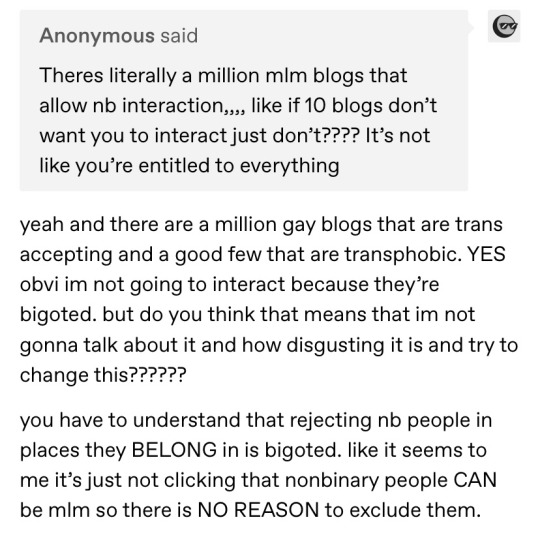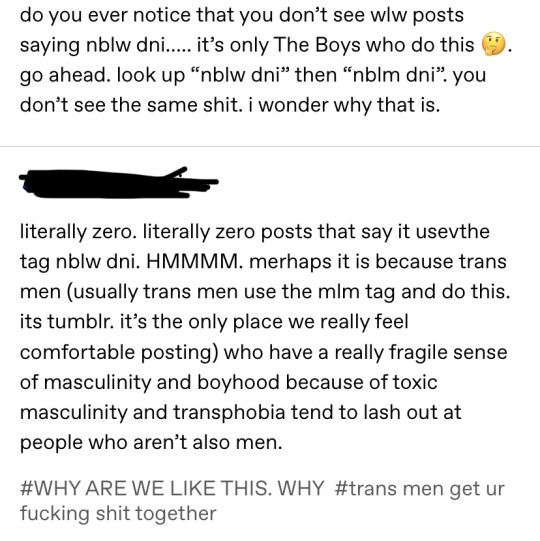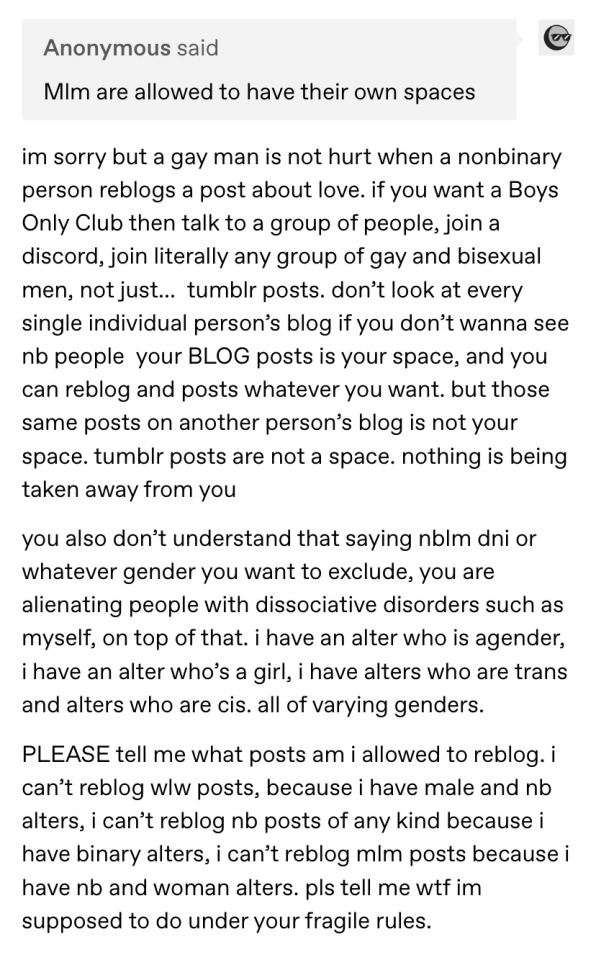#sincerely a man with DID (and nb alters)
Text







(found from a single blog.)
#i dont like the whole 'i have DID and this targets me specifically'#no. thats not how it works.#your female and nb alters are not allowed to interact. but your binary male ones are.#its very simple#sincerely a man with DID (and nb alters)#receipts
10 notes
·
View notes
Text
The long walk to freedom; Why Nelson Mandela never forgave ex-wife, Winnie
New Post has been published on https://thespearnews.com/2017/11/01/long-walk-freedom-nelson-mandela-never-forgave-ex-wife-winnie/
The long walk to freedom; Why Nelson Mandela never forgave ex-wife, Winnie
Nelson Mandela was laid to rest on 15th Dec 2013. John Carlin in his new book ‘Knowing Mandela,’ reveals why he never forgave the former wife who has featured through out the 10 day mourning period and even in the official programme.
TWO weeks before Nelson Mandela’s release from prison in February 1990 I went to see his wife, Winnie, at her home in Diepkloof Extension, the posh neighbourhood of Soweto where the handful of black people who had contrived to make a little money resided. It was known as Baverly Hills to Soweto’s other presidents.
Winnie’s home, funded by foreign benefactors, was a two-floor, three-bedroom house with a garden and a small swimming pool. The height of extravagance by black standards, it would have more or less met the aspirations of the average white, middle-class South African
Zindzi, Winnie’s slim and attractive second daughter, was 29 but looked younger in a yellow T-shirt and denim dungarees. It was 9.30 a.m. and she was in the kitchen frying eggs. She invited me in and started chatting as if we were old friends. The truth was that I had not scheduled an interview with Winnie. I had just dropped in to try my luck. But Zindzi saw nothing wrong in me giving it a shot.
Mum, she said, was still upstairs and would probably be a while. As I hovered about waiting (and, as it turned out, waiting, and waiting friends of Zindzi wandered in for coffee and a chat. Completing the South African middle-class picture, a small, wizened maid in blue overalls padded inscrutably around.
Finally, Winnie made her entrance, Taller than I had expected, very much the grande dame, she displayed neither surprise nor irritation at my presence in her home. When I said I would like to interview her, she responded with a sigh, a knowing smile and a glance at her watch. I said all I would need was half an hour. She thought a moment, shrugged her shoulders and said: “OK. But you will have to give me a little time.” She still had to put the finishing touches to her morning toilette.
The picture presented to me by mother, daughter, friends and cleaning lady was of a domesticity so stable and relaxed that, had I not been better informed, I would never have imagined the depths of trauma that lucked beneath.
Winnie had been continually persecuted by agents of the apartheid state during the 1970s and 1980s; she had borne the anguish of hearing her two small daughters screaming as the police broke into her home and carted her off to jail; she had spent more than a year in solitary confinement. Trusting that her confused and stricken children would be cared for by friends; she had been banished and placed under house arrest far away. But she was back, her circumstances altered dramatically for the better now that Mandela’s release was imminent.
One hour after her first entrance, she majestically reappeared, Cleopatra still needed her morning coffee, and motioned me to wait in her study while she withdrew into the kitchen. I had five minutes to take in the surroundings.
On a bookshelf there was a row of framed family portraits, a Christmas card and a birthday card. Only a month had passed since Christmas, but nearly four since Winnie had turned 53. I could not resist taking a closer look.
I opened the Christmas card, which was enormous, and immediately recognised Nelson Mandela’s large, spidery handwriting. “Darling, I love you. Madiba,” It said. Madiba was the tribal name by which he liked to be known to those close to him. On the birthday card he had written the same words.
If I had not known better I might have imagined the cards had been sent by an infatuated teenager. Once we began our interview. Winnie took on just such a role, playing the tremulous bride-to-be, convincing me she was in a state of nervous excitement at the prospect of rekindling her life’s great love.
Close up she had, like her husband, the charisma of the vastly self-confident, and there was a coquettish, eye-fluttering sensuality about her. It was not hard to imagine how the young woman who met Mandela one rainy evening in 1957 had struck him, as he would later confess, like a thunderbolt.
The Mandela the world saw wore a mask that disguised his private feelings, presenting himself as a fearless hero, immune to ordinary human weakness. His effectiveness as a leader hung, he believed, on keeping that public mask from cracking. Winnie offered the greatest test to his resolve. During the following years the mask cracked only twice. She was the cause both times.
The first was in May 1991. She had just been convicted at Johannesburg’s Rand Supreme Court of assault and accessory to kidnapping a 14-year-old black boy called Stomple Moeketsi, whom her driver had subsequently murdered. Winnie had been led to believe, falsely as it turned out, that the boy had been working as a spy for the apartheid state.
Winnie and Mandela walked together down the steps of the grand court building. Once again the actress, she swaggered to the street, right fist raised in triumph. It was not clear what she could possibly have been celebrating, except perhaps the perplexing straight off to jail and would remain free pending an appeal.
Mandela had a different grasp of the situation. His face was grey, his eyes were downcast.
The second and last time was nearly a year later. The setting was an evening press conference hastily summoned at the drab headquarters of the ANC. He shuffled into the room, sat down at a table and read from a piece of paper, beginning by paying tribute to his wife.
“During the two decades I spent on Robben Island she was an indispensable pillar of support and comfort… My love for her remains undiminished.” There was a general intake of breath. Then he continued: “We have mutually agreed that a separation would be the best for each of us… I part from my wife with no recriminations. I embrace her with all the love and affection I have nursed for her inside and outside prison from the moment I first met her.”
He rose to his feet. “Ladies and gentlemen. I hope you ‘ll appreciate the pain I have gone through and I now end this interview.”
He exited the room, head-bowed, amid total silence.
Mandela’s love for Winnie had been, like many great loves, a kind of madness, all the more so in his case as it was founded more on a fantasy that he had kept alive for 27 years in prison than on the brief time they had actually spent together. The demands of his political life before he was imprisoned were such that they had next to no experience of married life, as Winnie herself would confess to me that morning.
“I have never lived with Mandela,” she said. “I have never known what it was to have a close family where you sat around the table with husband and children. I have no such dear memories. When I gave birth to my children he was never there, even though he was not in jail at the time.”
It seemed that Winnie, who was 22 to his 38 when they met, had cast a spell on him. Or maybe he cast a spell on himself, needing to reconstruct those fleeting memories of her into a fantasy of tranquility where he sought refuge from the loneliness of prison life.
His letters to her from Robben Island revealed romantic, sensual side to his nature that no one but Winnie then knew. He recalled “the electric current” that “flushed” through his blood as he looked at her photograph and imagined their caresses.
The truth was that Winnie had had several lovers during Mandela’s long absence. In the months before his release, she had been having an affair with Dali Mpofu, a lawyer 30 years her junior and a member of her defence team. She carried on with the affair after Mandela left prison. ANC members close to Mandela knew that was going on, as they did about her frequent bouts of drunkenness. I tried asking them why they did not talk to Mandela about her waywardness, but I was always met by frosty stares. Winnie became a taboo subject within the ANC during the two years after Mandela left prison. Confronting him with the truth was a step too far for the freedom fighters of the ANC.
His impeccably courteous public persona acted as a coat of armour protecting the sorrowing man within. But there came a point when Mandela could deceive himself, or the public, no longer. Details of the affair with Mpofu were made luridly public in a newspaper report two weeks before the separation announcement.
The article was a devastating, irrefutable expose of Winnie’s affair. It was based on a letter she had written to Mpofu that revealed he had recently had a child with a woman whom she referred to as “a white hag.” Winnie accused Mpofu of “running around f***** at the slightest emotional excuse … Before I am through with you, you are going to learn a bit of honesty and sincerity and know what betrayal of one’s love means to a woman … Remember always how much you have hurt and humiliated me … I keep telling you the situation is deteriorating at home, you are not bothered because you are satisfying yourself every night with a woman. I won’t be your bloody fool, Dali.”
In private, Mandela had already endured quite enough conjugal torture. I learnt of one especially hurtful episode from a friend of Mandela some years later. Not long after the end of her trial, Winnie was due to fly to America on ANC-related business. She wanted to take Mpofu with her, and Mandela said she should not, Winnie agreed not to, but went with him anyway. Mandela phoned her at her hotel room in New York, and Mpofu answered the phone.
Extracted from Knowing Mandela by John Carlin
NB: In Mandela’s will, Winnie is NOT listed as beneficiary, she got NOTHING!
0 notes